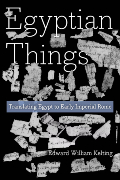
- ekelting@ucsd.edu
-
Arts & Humanities Bldg (RWAC)
Room 241
Mail Code: 0410
Associate Professor

Edward (Ted) Kelting received his Ph.D. in Classics from Stanford University in 2019 and his A.B. in Egyptology and Classics from Brown University in 2012. His research ranges across Egypt, Greece, and Rome in the early-imperial period. He is the author of Egyptian Things: Translating Egypt to Early Imperial Rome. Its titular “Egyptian Things” was an auto-ethnographic literary tradition called Aegyptiaca, in which culturally mixed Egyptians wrote about Egypt and its past for a Greek and Roman audience. His next project connects non-human animal precarity to other forms of ethnic, gendered, and social discrimination in imperial-era literature. At UCSD, he currently serves as director of the Center for Hellenic Studies.
For CV and an up-to-date list of publications with PDFs, see here.
Pronouns: He/His
Languages: Latin, Greek, traditional Egyptian, French, German
Affiliated Faculty: Classical Studies Program, Black Diaspora and African American Studies Program, Center for Hellenic Studies.
